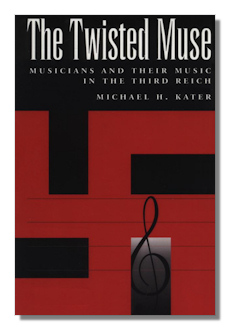
The Internet's Premier Classical Music Source
Related Links
-
Introduction
Acoustics
Ballet
Biographies
Chamber Music
Composers & Composition
Conducting
Criticism & Commentary
Discographies & CD Guides
Fiction
History
Humor
Illustrations & Photos
Instrumental
Lieder
Music Appreciation
Music Education
Music Industry
Music and the Mind
Opera
Orchestration
Reference Works
Scores
Thematic Indices
Theory & Analysis
Vocal Technique
Search Amazon
Recommended Links
Site News
 Book Review
Book Review
The Twisted Muse

Musicians and Their Music in the Third Reich
Michael H. Kater
New York: Oxford University Press. 1997.
Paperback. 344 pages.
ISBN-10: 0195132424
ISBN-13: 978-0195132427
Summary for the Busy Executive: Suspicious.
This book depressed the hell out of me. Of course the Nazi era hardly constitutes light reading, and I didn't expect a light-hearted "cozy." The broad outlines of the era are generally known (except in my state of Texas, where the textbooks will undoubtedly be changed to fantasy any day now). The devil lies in the details.
I appreciate Kater's research. He has gained access to archives previously unavailable as well as to witnesses formerly silent. I also admire his insistence on the complexity of the situation. We think of the Nazis opposing all Modernism, but this wasn't the case. In fact, Goebbels especially wanted an "Aryan" Modernism. Composers like Egk, Orff, Blacher, von Einem, Fortner, and Wagner-Régeny – if they didn't exactly flourish – still got performances. Even twelve-tone composers (as long as they didn't use Schoenbergian serialism) were heard. It wasn't all Pfitzner and Richard Strauss. Pfitzner – all for the Nazis – indeed ran into trouble because Hitler, mistakenly, thought him of Jewish ancestry – after all, he looked Jewish. This room to maneuver arose from the penchant of the Nazi leadership to deliberately leave bureaucratic jurisdictions vague. No fewer than three men (four, if you count Hitler himself) had control over the arts: Goebbels, Goering, and Rosenberg. All competed with one another. Something banned by one could easily be allowed by the others, simply as part of political infighting. This sort of thing went from the bottom to the very top of the Nazi hierarchy. The idea was that settling the dispute at the next higher level increased the authority of that official. At the reductio ad absurdum, only one person (guess who?) made policy, which happened a surprising amount of the time. Delegation was not one of the Reich's strong points.
Part of the Nazis' problem (besides genocidal racism and ruthless imperialism) was that they never could define "Jewish" or "degenerate" music without looking first at the composer. They found themselves in the same difficulty when they tried to determine the nature of "German" or "Aryan" music. There was no box an official could conveniently check off. However, music critics believed that German science would identify the racial musical characteristics some fine day.
Lack of a thesis plagues this book. We get stuff in snippets and chunks. It really comes across as a rogues' gallery, with Kater parading one big name (and some not-so-big names) after another before his judgment seat. With only a few exceptions, nobody who stayed in Germany – not even Hindemith, who eventually left, and who had a wife of Jewish ancestry – escapes the taint. The only people who seem to get off are those who left by 1935. I don't pretend to know a tenth as much as Kater about this period. Nevertheless, I do complain. First, one fact I know concerns Kater's insistence on the influence of Wagner's Mein Leben on Hitler's Mein Kampf, as suggested by the title. Unfortunately, the publisher, not Hitler, named that book. Hitler's title was, predictably, more bloated. Other than railing against Jews as corrupters of pure German culture, Kater argues no further similarity.
More important, Kater seems to have little idea of life in a terror state. His characterization of Distler in particular seems to me particularly uncharitable. The Lutheran Church had split into two factions: the traditional, so-called Confessionalist Church and the schismatic German Church. The Confessionalists tried to accommodate themselves to the Nazis, on the "render unto Caesar" principle, but they also wanted the state out of religious matters. The German Church, rabidly anti-Semitic, wanted to rid Christianity of its Jewish influences – dumping the Old Testament, for example – and emphasizing a blond, Aryan warrior-Christ. So according to Kater, the Confessionalists were mildly pro-Nazi and the New Germans were really pro-Nazi. However, he downplays the role of some Confessionalists in the Resistance. Distler, for example, became part of the Bonhoeffer circle. His many academic appointments resulted from his being hounded from one post to another by fanatic Nazis. He sent his wife and family out of the country and committed suicide, rather than serve in the Wehrmacht. He may not have been heroic, but except for a brief period when he believed the Nazis would reform church music along his lines, he was never enthusiastic about the Third Reich. He seems to have lived in a constant state of fear, and he made very few accommodations. Hartmann went into internal exile, but according to Kater, he was supported by his wealthy father-in-law. So by Kater's standards, he wasn't particularly heroic, either. Fortner was a homosexual, a capital offense in the Third Reich. He kept quiet. Strauss's daughter-in-law was Jewish (although his son was a Nazi). Twenty-six members of her family, including her mother, were killed at Dachau.
Most of us aren't heroes. In such a situation, I know I would (assuming I wasn't rounded up and killed) keep my head down as low as possible as I waited for the storm to pass. Kater holds everybody to a high account, in some cases over-zealously. In general, I prefer Erik Levi's Music in the Third Reich, unfortunately out of print. Try getting it from your public library.
Copyright © 2010 by Steve Schwartz.



















